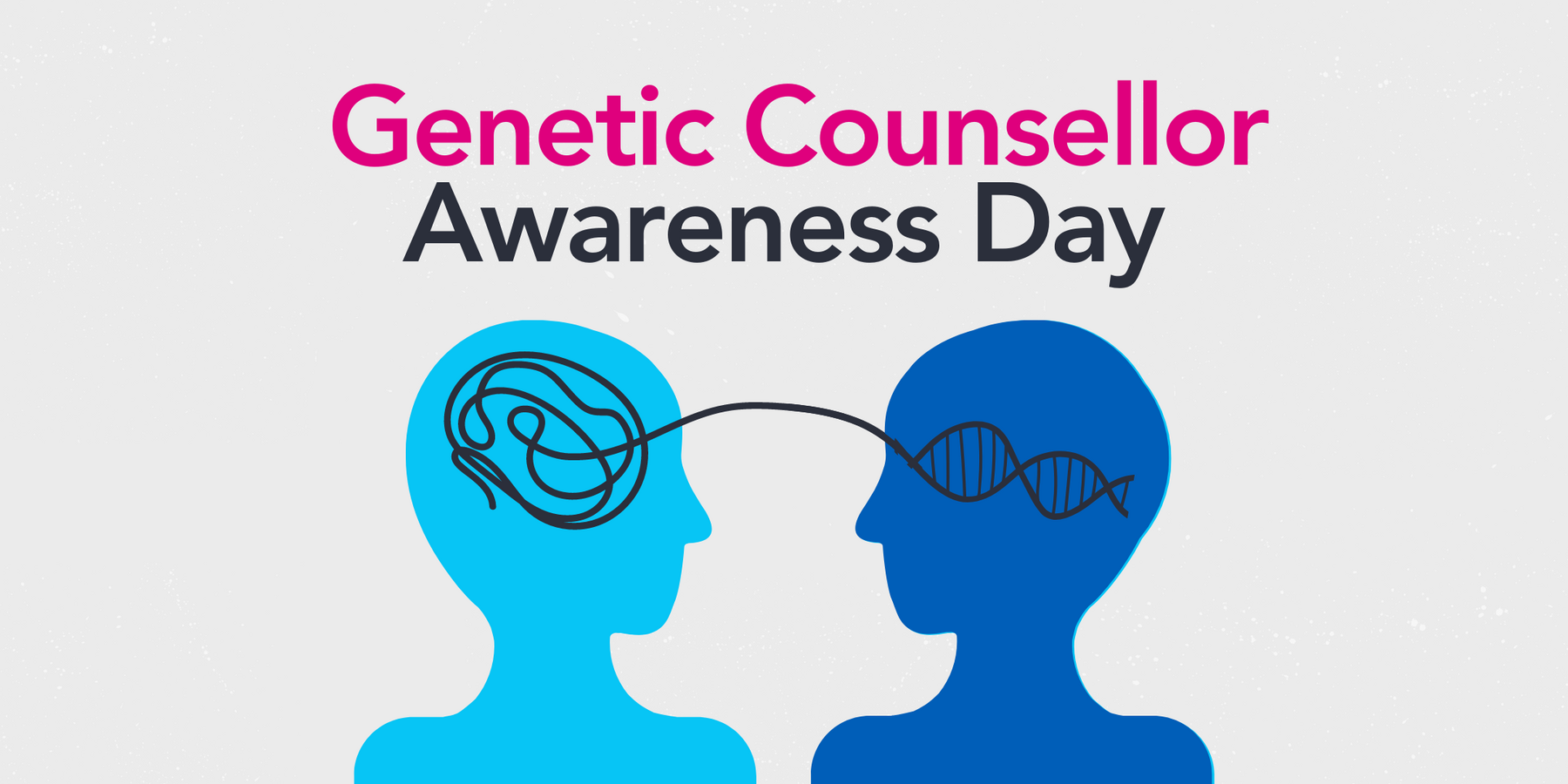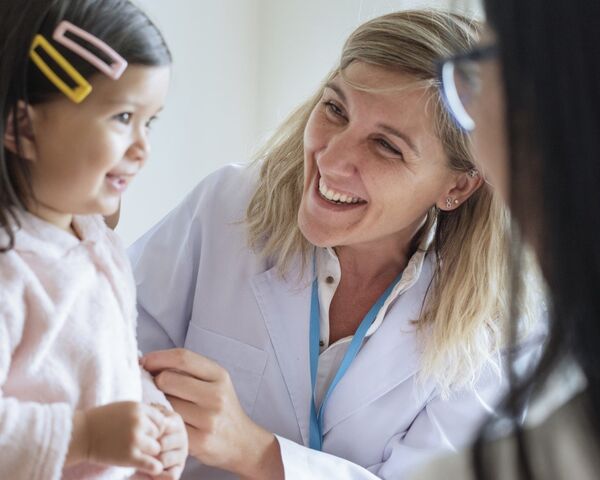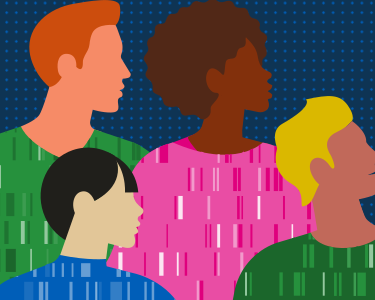Celebrating the role of genetic counsellors in healthcare
By Amanda Pichini on
Genetic counsellors have the expertise to help patient and families understand complex information about the genetic aspects of health conditions, helping them make informed decisions. In the UK and worldwide, there are thousands of talented genetic counsellors with specialist knowledge in genetics and patient care. Thursday 10th November 2022 marks the 6th annual Genetic Counsellor Awareness Day, which is dedicated to helping the public understand the important role genetic counsellors can play in healthcare. We asked Amanda Pichini, Clinical Lead for Genetic Counselling at Genomics England, to share her thoughts on the profession and why it has become so important in the era of genomic medicine.
Genomics has brought a wealth of knowledge to the diagnosis and treatment of many conditions and is making a tremendous impact in fields such as cancer and rare conditions. Genetic counsellors empower patients and their families by giving them information, guidance and emotional support to understand their family history, and make informed choices about genetic testing options and results. As genomics becomes more commonly used in healthcare, more and more people are likely to require genetic counselling, and more healthcare professionals will rely on their expertise.
Who can benefit?
Genetic counselling can have an impact across a lifetime:
- from before birth (providing advice to couples who have a higher chance of passing on an inherited condition, or whose pregnancy may be affected by a genetic condition);
- in childhood (providing support to families where a child has a suspected or confirmed genetic condition);
- through to adulthood (assessing when individuals may have a higher risk of cancer based on their family history, and/or facilitating genetic testing to identify individuals who may be at increased risk).
In the UK, genetic counselling can be accessed through the NHS by a referral from a healthcare professional based on medical or family history. This is usually because there is a suspicion of a rare condition, or a condition caused by changes in a single gene.
Helen’s story
Helen was referred for genetic testing to look for an inherited gene alteration called Lynch syndrome, following a diagnosis of womb cancer. Here she shares with us how genetic counselling has empowered her to navigate the complexities and uncertainties of living with a genetic condition.
I first met my genetic counsellor nearly two years after my womb cancer diagnosis. She was so lovely and could not have been more helpful and supportive, spending time listening to me, which made me feel acknowledged and validated. She also thoroughly explained and made sure I understood all the implications of testing for Lynch syndrome, to both me and my family, and all the possible outcomes of testing, which helped my decision to go ahead.
Importantly, she explained to me that my first-degree relatives could be tested if I was found to have Lynch syndrome and how that would happen, which meant I could keep my family informed on how my diagnosis might impact them. This was especially relevant to my two grown-up sons who might be thinking about planning their own families in the next few years.
Even though I went into genetic counselling already keen to be tested for Lynch syndrome, genetic testing was still a big decision, and it was great to be able to talk through all the implications first – once that genie was out of the bottle there would be no putting it back!
My two sons and sister all decided to have a genetic test and luckily none of them had inherited Lynch syndrome, even though each of them had a 50% chance. My dad, who was the one with a history of cancer, had died by the time I was diagnosed, but we (including the genetic counsellor) were all surprised when it turned out I’d inherited my gene alteration from my mum who, at 79, had never had cancer.
Genetic counsellors play such a key role in making genetic testing understandable, supporting people with making potentially life-changing choices and empowering them to manage their own condition. I think celebrating Genetic Counsellor Awareness Day is a great way to shine the spotlight on this fantastic yet under-recognised group of healthcare professionals, especially as their skills will increasingly be called upon as genomic medicine scales up across the NHS in the years to come.
Dave’s story
Dave received a clinical diagnosis of Microphthalmia, a rare genetic eye condition which can cause vision loss or blindness, at 9 months of age. He shares how genetic counselling has been helpful in finding answers to complex questions surrounding his genetic condition.
My wife and I met a genetic counsellor in 1998 at Cardiff University Hospital when we first thought about trying for children. The genetic counsellor answered most of our questions about the probabilities involved in passing on my rare genetic sight condition to any children, which is essentially a probability of 50/50. This assessment proved to be accurate as neither of my children have inherited my sight condition.
Years later in March 2017 - after having children - we met Georgina Hall, Principal Genetic Counsellor who is based at the Rare Genetic Eye Clinic at the Royal Manchester Eye Hospital. Georgina suggested that myself and my family participate in Genomics England’s 100,000 Genomes Project. She explained that, although no absolute guarantees could be given, as new technologies and approaches to analysing genomes emerge, I may over time acquire answers to the big questions I still had, such as, ‘Why did my eyes not develop properly in the first stages of my life?’ and, ‘Why am I losing the remainder of my sight now?’
I agreed to participate in the 100,000 Genomes Project by giving a sample of my blood. I also agreed to being informed about any answers that might emerge through research over time about my sight condition. Genetic counselling continues to be available to help answer any questions I have about the on-going whole genome testing process.As we move into a new information technology age, genetic counselling becomes even more important to help people understand their own health and that of their families. The NHS Genomics Medicine Service is being rolled out over seven geographic areas across NHS England as genome sampling and analysing becomes more common and ever more sophisticated. Results can be given faster and are now better understood thanks to precision genomics. As genomic medicine expands, so more genetic counsellors are needed to support and guide patients and families, particularly parents of newborn babies to enable people to make informed choices about lifestyle changes, drug therapies and surgical procedures that could help improve quality of life.
Navigating concerns and ethical dilemmas
Receiving a diagnosis, having a family history of an inherited condition, or making a decision to have genetic testing can bring on a range of emotions, complexities and uncertainties – and each individual brings their own experiences, values, beliefs and expectations. Genomic information can be confusing or misleading, sometimes unexpected and even life-altering. People may feel relief, guilt, hope, worry or anger, whereas some may have concerns about how a condition will affect their future life plans, worry about discrimination or confidentiality, or how to share information with their family members. Others may be hugely motivated to have testing to end a diagnostic odyssey for themselves or their child but find it difficult to access support following results.
Genetic counsellors are well equipped with the skills to manage these challenges; they explain inheritance patterns, order genomic tests, refer patients for screening, link them to patient organisations for support and address the psychological and ethical issues raised for individuals and their families. The goal is to ensure each individual and family can make the choice that is right for them – sometimes this means not having genetic testing, or postponing.
Genetic counselling in the UK
Genetic counsellors work as part of a multidisciplinary team alongside doctors, clinical laboratory scientists, nurses, midwives and other healthcare professionals. Most genetic counsellors work in regional Clinical Genomic Services, but are increasingly working within other areas like cardiology or oncology. There are just over 300 genetic counsellors in the UK, represented through the Association of Genetic Nurses and Counsellors – a small specialist workforce compared to over 700,000 practicing nurses. The total number of genetic counsellors globally is approximately 7000, in at least 28 countries. There is growing interest in the profession, with competitive genetic counselling training programmes in the UK, however, there is still a recognised need for larger numbers of genetic counsellors in the coming years.
The future of genetic counselling
As a profession, we are really well equipped with a wide range of skills that makes us able to adapt to the rapidly changing field of genomics. As more and more healthcare professionals are having to discuss genomic testing with their patients, there will always be roles for genetic counsellors to help educate their colleagues, pick up the more complicated cases and be the specialist who ‘takes care of the family’.
Sara Levene
Consultant Genetic Counsellor at the Centre for Reproductive and Genetic Health and Chair of the Association of Genetic Nurses and Counsellors
With genomic services expanding across the NHS such as the NHS Genomic Medicine Service in England, this brings new opportunities for providing more personalised care, as well as impacts for patients, families and wider society. We are continually learning more about the influence of genomics in common health conditions. There is an increasing amount of genetic testing available through private providers to screen for conditions or determine ancestry, often without discussion with a healthcare professional. There is a need for continued research and engagement to understand the impacts of these changes, as well as implications for data sharing and trustworthiness, and equity of access and care.
What does this mean for the future of genetic counsellors? Their skill set will become increasingly crucial to help people navigate the complexities of genomic information and use it to maximise health gains while minimising potential harms. There is also an increasing number of genetic counsellors with exciting and innovative roles – driving education and training strategy to support the development of the healthcare workforce; working in primary care to improve access; providing subject matter expertise to support laboratories and industry; incorporating genetic counselling expertise into the development of digital tools; working within charities or in patient advocacy roles; and leading research into the ethical and social impacts of genomics.
Genetic counsellors make great researchers and communicators – they are curious about people, are excellent listeners, and are motivated to make things better for the patients they serve. Currently, I am using my research skills to ensure that the content developed for the Newborns Genomes Programme meets the needs of parents, patients and healthcare professionals. This means finding out what they need and then synthesising this into meaningful insights we can use for their benefit.
Dr Jonathan Roberts
Genetic Counsellor at the Cambridge Clinical Genetics Service and Clinical Content Developer at Genomics England
Celebrating genetic counselling
Genetic Counsellor Awareness Day aims to highlight the profession and the variety of roles it can play in healthcare. It is clear that genetic counsellors are at the forefront of the evolution of healthcare – which is becoming more preventative and personalised. Helping patients and their families navigate their concerns about genetic conditions and testing can be extremely challenging, but also rewarding.
At Genomics England, we have genetic counselling leadership embedded in the organisation, providing expertise to the design and delivery of our services and how we interact with our participants, to support our vision of helping everyone benefit from genomic healthcare. I feel hugely privileged to be part of a profession that is always looking ahead, seeking new opportunities to improve care for patients and families, and approaching challenges with thoughtfulness and integrity – I am grateful that we can bring this to attention today.
Join us in celebrating Genetic Counsellor Awareness Day and help raise interest in the crucial work genetic counsellors do in their communities.


